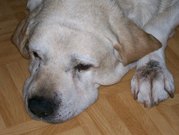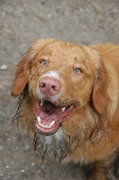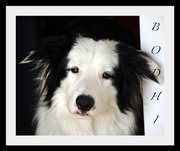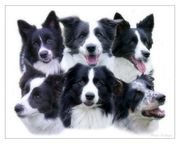Wat is nu de echte waarheid van de eiwitten in brokken ? 

Hoe hoog mag dit % echt zijn ?
Heb er effe naar gezocht op het internet en word er niet wijs van.
Had iemand gevonden en die zei dat het niet hoger mag dan 30% .
Wat is nu echt de waarheid ???
Orijen komt erboven met de %
Acana komt er ook boven.
Denk taste of the wild ook.
Helaas, dit onderwerp staat op slot.
Dit komt doordat het onderwerp niet meer recent is en in het hondenforum archief terecht ik gekomen.
Als je over "Wat is nu de echte waarheid van de eiwitten in brokken ?" wilt praten in het hondenforum dan kun je het beste een nieuw onderwerp aanmaken
 meike
meike  3 doggies
3 doggies

Voedingsrichtlijnen van Fediaf vind je hier:http://docs.google.com/viewer?a=v&q=cache:t37d1j5Ao00J:www.fediaf.org/Pages/FEDIAF%2520Nutritional%2520Guidelines%2520-%252022%2520September%25202008.pdf+FEDIAF+NRC&hl=nl&gl=nl&pid=bl&srcid=ADGEESjZNGcJzCJYrHC7mEC7C8ZOpD-eCiaNbfRCvh6nL5-JMQhGNoE00NN-95AqhrzJm6U5mBuykI_Ut4Y4j36NsGMfVriQzlF1w26UUF-pBci2KSAlcvrR-g_2velsFi2lzo6UrYht&sig=AHIEtbSu1p9Crl3IVlxhsO9JpPB7rNj9_w
De aanbeveling is 18%, maar er is geen maximum opgegeven.
En wellicht is dit een interessant artikel voor je:
Myths of Protein:
http://files.championpetfoods.com/Myths_of_High_Protein.pdf Het is wel van Champion Petfoods, maar ze gebruiken onafhankelijke bronnen.
 Jimmy (Zinno)
Jimmy (Zinno)
 3 doggies
3 doggies

Wat is nu echt de waarheid ???
dat er veel onzin op forums wordt over verteld...

Meike, kan het deel niet openen van fediaf.
Zinno, ja dat weet ik, maar als je leest dat er 2 honden zware nierproblemen hebben gehad na maar een tijdje orijen te voeren, dan stel ik me toch de vraag, denk dat dit normaal is.

Meike, 18% is wel heel laag, denk dat er heel weinig brokken zijn dit deze % hebben, ze zitten er prachtisch dubbel over, toch de graanvrije brokken.
 Priscilla
Priscilla  3 doggies
3 doggies

Ik betwijfel ook of de brokken die zo worden aangeraden omdat ze vrij zijn van graan verder ook wel in orde zijn als we het over de samenstelling hebben.
Er is over het voer zoveel tegenstrijdige informatie te vinden, om gek van te worden !
 Angela • Bodhi
Angela • Bodhi

 3 doggies
3 doggies

In brokken is het lastig zeggen, omdat veel eiwitten ook van vulmiddel komt (graan, groente e.d.). Ook graanvrije brokken zoals Orijen hebben opvulling.
 Linda en Bodhi
Linda en Bodhi  3 doggies
3 doggies

Ik betwijfel het ook zeer en heb het vergeleken met als je vers zou geven en dit verschil is erg groot.
was eerst erg overtuigd van bovenstaande merken. maar ga nu toch voor Dog lovers gold.

Ik gebruik brok voor 1 dag in de week en dan 2weken per jaar, zou orijen dan bv schade kunnen veroorzaken aan mijn woefkes ?
 Angela • Bodhi
Angela • Bodhi

 3 doggies
3 doggies

Nee joh.. Ik denk dat de honden met nierproblemen hier sowieso al een zwak voor hadden. Dan hadden ze dat met andere voeding ook wel gekregen.

het eiwit gehalte zou je eens kunnen gaan vergelijken bij je dierenwinkel, een pak voor nierdieet, die hebben ze bij de dierenwinkel, en het pak wat je gewoon gebruikt, kijk daar eens naar de eiwitten of er veel verschil is. misschien een tip ?
 S&F.
S&F.
 3 doggies
3 doggies

'Eiwitten' dat woord is erg algemeen.
Net als wat Angela zegt het verschil tussen dierlijke- en plantaardige eiwitten is best groot.
Ik ben geen deskundige maar de afbraak van eiwitten begint in de maag, waar ze uiteindelijk omgezet worden tot aminozuren. Deze aminozuren worden door de lever weer omgezet in eiwitten maar dan eiwitten die bij een hond (of mens) passen.
De aminozuren die overig zijn of eiwitten die "oud" zijn verlaten ons lichaam via urine dat, je hoort hem al aankomen, via de nieren gaat.
Dit zou dus best een logische verklaring kunnen zijn. Verder ben ik van mening dat je moet voeren naar de aard van het beest. Een cavia geef je geen biefstuk en een hond geen graan. Het voorkomt een hoop gezeur niet altijd zo tegen de natuur in te gaan.

Willemijn, heb is gekeken naar een speciale voeding voor de nieren, en deze bedraagde maar liefst 30% eiwitten. 
 S&F.
S&F.
 3 doggies
3 doggies

Haha ja dat weet ik. Alleen het is meer dat ik soms dingen lees zoals een hond heeft die granen nodig ik denk hmm..? Dus ik plakte het er gelijk maar even aan vast haha.
 Diablo & Maya
Diablo & Maya  3 doggies
3 doggies

Ik voer gewoon orijen, ben er zeer tevreden over. Mijn honden doen het er goed op, zien er mooi uit en hebben, zo ver dat kan  , mooie drolletjes.
, mooie drolletjes.
Ik denk dat het voeren van een bepaald voer gewoon ook aan je hond ligt, bij diablo hoef ik geen KVV te gaan voeren daar trekt meneer zijn neus voor op dusja hier alleen brokjes.
Enja eiwitten zorgen toch eigenlijk voor de spieropbouw?
 Esther
Esther  3 doggies
3 doggies

Helaas verkopen dierenspeciaalzaken ook 'dieetvoer', tenminste dat zeggen ze.
Het voer in de dierenspeciaalzaak is altijd onderhoudsvoer. Zij mogen geen dieetvoer verkopen.
Alleen een dierenarts mag dieetvoer voorschrijven en verkopen. Een dierenspeciaalzaak kan ook nergens dieetvoer bestellen, enkel onderhoudsvoer.
Haal een (bijv.) nierdieet dan ook NOOIT in de dierenspeciaalzaak als je hond een aantoonbaar nierprobleem heeft.
Helaas is de voorlichting in de dierenspeciaalzaken niet altijd eerlijk.
Daarentegen zijn klanten eerder genegen om een verkoper uit een speciaalzaak te geloven, dan een dierenarts. Dit komt door het vooroordeel dat 'de dierenarts altijd te duur is'.
Een dierenarts kost veel, maar is niet duur...
 Linda en Bodhi
Linda en Bodhi  3 doggies
3 doggies

in nierdieet van royal canin zit 16 procent eiwit, voor degene die het wil weten.
 cia v.d. heijden
cia v.d. heijden
 3 doggies
3 doggies

Het eiwit percentage mag niet hoger liggen dan 30 % in brokken. Dit is het maximum.
 Jimmy (Zinno)
Jimmy (Zinno)
 3 doggies
3 doggies

Het eiwit percentage mag niet hoger liggen dan 30 % in brokken.
zegt wie dat???onderzoek dat daar is scheef gelopen
als 40% eiwitt zo slecht was denk je dat orijen dan nog verkocht werd in amerika
laat je toch niks wijs maken,1000x meer mensen als in europa voeren al jaren lang orijen zonder probleem
dat bedrijf is al bezig van in de jaren 70
denk je nu echt dat ik die onzin van die enkelingen hier geloof
en nogmaals je het eiwit en eiwit he begin als eens te kijken vanuit welke bron het eiwit komt eer je gaat zeggen of het goed of slecht is
en nee 30% is niet de max heel dat onderzoek in utrecht is gebaseerd op dikke zever.
 cia v.d. heijden
cia v.d. heijden
 3 doggies
3 doggies

Nou ik weet niks van een onderzoek in Utrecht over eiwit.
Bij jou is alles snel dikke zever hé Zinno....
 Jimmy (Zinno)
Jimmy (Zinno)
 3 doggies
3 doggies

van die 30% is ook dikke zever
waarom denken mensen dat je bij een hond met nier problemen laag eiwit moet geven omdat die brok fabrikanten dat er van gemaakt hebben.
onderzoek heeft al lang uitgewezen dat voer wat uitsluitend eiwit heeft afkomstig van dieren een gunstige invloed heeft op de nieren.
heb dat al eens gezegd je hebt eiwit en eiwit
 Jimmy (Zinno)
Jimmy (Zinno)
 3 doggies
3 doggies

veel lees plezier:
Hello again ***** and thanks for writing on this subject.
We agree with your position regarding the affect of protein on large breed puppies and the kidneys: In both cases, calcium and in particular phosphorus are the key indicators – not protein. Given that we are producers, I can certainly understand that dog owners would be skeptical of our position, so the best way to present our protein-based argument might be to offer you research and opinion independent of our own.
I’ll start by confirming that AAFCO does not publish a maximum protein amount for dogs and neither do they have a minimum for carbohydrate. As protein in the diet increases, carbohydrate decreases which mimics the natural diet for which dogs and cats are evolved (in nature, dogs eat very few carbohydrates and are evolved to metabolize proteins and fats from meat). AAFCO however does set maximum levels for calcium and phosphorus (these can be substantiated by googling “AAFCO nutrient levels for dogs”). When present in excess, phosphorus in particular is known to have a negative effect on the kidneys (see research cited below) and, when combined with excess calcium, phosphorus also affect the rate of skeletal development (a concern for large breeds). Now we’re not saying that AAFCO is the “be all, end all” – they’re not, but AAFCO does set a minimum and maximum nutrient inclusions, which provides a useful start point (interestingly enough, you’ll also see brands like ROYAL CANIN and EUKANUBA SIZE now feature large breed puppy diets above 30% in protein – which was unheard of 3 or 4 years ago…
Although I can’t comment specifically on the information your member received from our customer service, I can apologize as the response was likely a result of misunderstanding or miscommunication. On large breed puppies (taken from the “b natural site” (An excellent information resource) http://b-naturals.com):
www.eukanuba-eu.com
This article reiterates that high protein does not cause OCD or HD, in either the hips or elbows:
Research into the growth of Great Danes (Nap RC, The Netherlands,) has shown that the protein level of a diet has no significant influence on skeletal development. High protein intake does not result in increased risk for OCD or HD, and there is no effect on the development in the longitudinal growth of the bone."
Additionally, while protein does not cause orthopedic problems, other nutrients can.
www.vetmed.ucdavis.edu
"In addition to excessive calcium intake, researchers have shown that over nutrition can also initiate these disturbances in skeletal maturation and growth. An excess protein intake, without an excess of other nutrients revealed NOT to influence skeletal maturation and growth in growing Great Danes (Ref. 2)."
This would include supplementation of calcium to processed diets, or could occur when feeding raw diets to puppies that are more than 50% raw meaty bones. Calcium amounts are adequate in commercial pet foods, and a diet of no more than 40% to 50% raw meaty bones is an appropriate amount for a growing puppy. This article also concludes that certain breeds may require less calcium than others for proper growth:
Further, the above article goes on to state:
"Therefore it is advised not to feed young dogs ad libitum or excessively, to prevent the development of (causative factors for) osteoartrosis. It is also common practice to advise a weight loosing programme to those dogs which suffer from osteoarthrosis as an aspect of conservative treatment or as an aid in surgical treatment of dogs with ED."
It is not excess protein that causes joint problems, but over feeding dogs can contribute to arthritis and orthopedic problems. Please note that most orthopedic and joint problems are inherited, but puppies and dogs that are over weight have a greater chance of an increase in pain and discomfort, and the potential of developing orthopedic problems as younger animals and arthritis later on in their life.
And while some nutritionists recommend feeding more fiber than meat and protein for weight gain, this can also have consequences, as it can block absorption:
www4.nas.edu
"The most obvious way to help a dog trim down is to feed it smaller amounts of food on its regular feeding schedule, and to make sure the dog is not being fed table scraps or getting into the food bowls of other dogs in the neighborhood. Owners may also choose a low-calorie "diet" dog food or food high in fiber, which may help the dog feel full without consuming too many calories. Too much fiber, however, can reduce the absorption of important nutrients."
In conclusion, a logical response to feeding puppies would include:
- Use high quality proteins:
These include using premium brands of dog food, or if feeding a raw or home cooked diet, use as much variety in animal proteins as possible. Don't skimp on the amount of proteins fed as these contribute to healthy growth, organ health and strong immune systems.
- Keep puppies and growing dogs lean.
Overweight and obese dogs have a much higher chance of developing arthritis and orthopedic problems.
- Don't overdose the Calcium:
Do not supplement with calcium if you use a commercial diet. For raw diets, use 50% or less of raw meaty bones in growing dogs. For home cooked diets, supplement at no more than 800 milligrams per pound of food served.
- Don't use high fiber diets for weight reduction:
Fiber, starches and grains can actually block certain nutrient uptake from the food served.
As regards the concept of protein negatively affecting the kidneys this is simply not the case. We have not found a single study to confirm this position and have mounds to the contrary. I have taken the liberty of copying a few of the studies that are available on-line below. I should perhaps also point out that not all high-protein diets are equal. Some foods generate high-protein by using meals, which are typically high in ash, and therefore high in mineral content of which – you guessed it – elevated levels calcium and phosphorus would be a concern to large breed puppies, and phosphorus in general for kidney health in dogs of all breeds and life-stages. The information below is taken from www.dogaware.com – a great site for general information.
Is a Low Protein Diet Necessary or Desirable?
Following are links to a series of articles and studies on the roles of protein and phosphorus in the diet of dogs with kidney failure. I have provided excerpts from these articles, but I would encourage you to read them in their entirety if you are dealing with a dog with kidney disease, as many of them contain a great deal more information than I will show here.
Dogs with kidney problems by Dr. Lucy Pinkston, D.V.M.
"Because by-products of protein digestion are the main toxins that need to be excreted by the kidneys, an obvious assumption might be that all one needs to do is to cut out the protein and the kidneys wouldn't have any more hard work to do. . . . There is significant evidence, however, that the daily protein requirements actually increase slightly for dogs in chronic renal failure. Therefore, severely restricting the protein for such a dog is likely to result in protein malnutrition, in spite of the fact that the levels of blood urea nitrogen, or BUN (the primary by-product of protein metabolism) would be correspondingly lower." This article contains a great deal more useful information in easy to read format.
Are High Protein Diets Harmful to a Dog's Kidneys? from the Veterinary Services Department, Drs. Foster & Smith, Inc.
"The myth that high-protein diets are harmful to kidneys probably started because, in the past, patients with kidney disease were commonly placed on low-protein (and thus low-nitrogen) diets. Now we often put them on a diet that is not necessarily very low in protein but contains protein that is more digestible so there are fewer nitrogen by-products."
The Mythology of Protein Restriction for Dogs with Reduced Renal Function by Kenneth C. Bovee, DVM, MMedSc
"Morris subsequently developed, produced, and sold a low-protein diet, KD, for dogs with renal failure. He and others were influenced by the erroneous work hypertrophy concept for urea excretion advanced by Addis. While experimental or clinical data were never published to support the value of this or other diets, the concept was broadly accepted without challenge in the veterinary literature." This article talks about the history of protein restriction, and about 10 recent experimental studies that have failed to provide evidence of the benefit of reduced dietary protein to influence the course of renal failure. This article is no longer on line, but I have a copy of it that I could send to anyone who is interested in reading it (ask for Bovee.pdf).
Nutrition and Renal Function from the Purina Research Report
"Dietary Protein and Renal Function: Results of multiple studies indicated that there were no adverse effects of the high protein diets." This report also includes information on metabolic acidosis and on the beneficial effects of omega-3 essential fatty acids in patients with chronic renal failure. The complete reports on each of the three studies mentioned in this report are no longer available online, but I have copies of them that I could send to anyone who is interested in reading more, as follows: "Effects of Dietary Lipids on Renal Function in Dogs and Cats" (ask for Brown.pdf); "Effects of Dietary Protein Intake on Renal Functions" (ask for Finco.pdf); and "Acid-Base, Electrolytes, and Renal Failure" (ask for Polzin.pdf).
Feeding the Older Dog from the SpeedyVet Clinical Nutrition Library
"The assumption was that low-protein diets retarded the progression of renal degeneration. This assumption was disproved, using partially nephrectomised dogs, which showed no uraemic signs and had reduced but stable renal function for 48 months. These dogs did better on moderate-protein diets than on low-protein diets. There is no direct evidence that high protein intake damages canine kidneys or that reducing protein intake in dogs with renal dysfunction results in preservation of either renal structure or function."
Dietary Management of Chronic Polyuric Renal Failure from the SpeedyVet Clinical Nutrition Library
"Dietary protein restriction improves the clinical signs and quality of life of uraemic animals with both naturally occurring and experimentally induced renal failure. . . . However it is highly questionable whether protein restriction is appropriate in the azotaemic, but non-uraemic patient. The main risk of protein restriction is protein deficiency. The protein and amino acid requirements of dogs and cats with chronic renal failure have not been established, but may well be increased. . . . The main justification for protein restriction early in the course of renal failure would be if it was proven to slow progression of disease. The data that are available do not support this case in dogs. Dietary protein has been shown to affect renal haemodynamics in the dog, however, moderate protein restriction does not alleviate glomerular hypertension, hyperfiltration and hypertrophy. . . . Thus there is no evidence that moderate protein restriction slows the progression of renal failure in dogs, and it is not recommended in dogs which are not uraemic."
Demystifying Myths About Protein from Today's Breeder Magazine
"In contrast, research over the past 10 years or so has shown that protein does not harm the kidney of dogs. In studies conducted at the University of Georgia in the early 1990s, both in dogs with chronic kidney failure and in older dogs with only one kidney, protein levels as high as 34 percent caused no ill effects. . . . In other studies, David S. Kronfeld, Ph.D., indicated that compared with high- or low-protein diets, moderate-protein diets, those with up to 34 percent protein, had no ill effects in dogs with chronic renal failure and were associated with general improvement."
Fortify The Food Bowl For The Aging Canine by Susan Thorpe-Vargas, Ph.D. and John C. Cargill, M.A., M.B.A., M.S.
"Because of certain biochemical requirements, the healthy geriatric dog requires about 50 percent more protein than the young adult, and depending on the quality of the protein, it should make up 20 percent to 30 percent of the total calories ingested. . . . Until recently, protein restriction was recommended in an effort to protect renal function. Limiting protein fails to prevent urinary filtration problems . . . Indeed, newer research shows dietary protein is not detrimental to kidney function. On the contrary, protein restriction can result in impaired wound healing, diminished immune function and lowered enzyme activities and cellular turnover. Those dogs with impaired renal function do better with dietary phosphorus restriction; however, limiting this mineral is unlikely to delay the onset of renal disease or to benefit healthy geriatric dogs."
Dietary Management for Clinical Disorders in Dogs from the Journal of Indian Veterinary Association, Kerala
"Recent research on dietary protein and the kidney has shown that
o dietary protein does not cause renal failure
o dietary protein does not appear to be involved in the progression of chronic renal failure
o inappropriate restriction of dietary protein may actually have an adverse effect on the normal or compromised kidney"
Kidney Failure from the Iams nutrition symposium
“'For years, physicians and veterinarians have treated renal failure by reducing protein levels in diets,' said Gregory Reinhart PhD, an Iams researcher. 'After working with leading universities, we have now found that restricting protein in a dog's diet may do more harm than good by potentially putting the companion animal at risk of protein malnutrition.'”
Managing a Renal Crisis by Martha S. Gearhart, DVM
". . . at least one study has taken several groups of dogs in kidney failure and fed them diets that varied in protein level and phosphorus level. The groups with severely restricted phosphorus lived longer than the groups with normal or high levels of phosphorus. The protein intake made no difference at all in longevity. . . .
"It is important to remember that phosphorus is more important than protein -- feeding vegetables or salt-free crackers to a dog in kidney failure will not add protein but it will add phosphorus."
Dietary Protein and the Kidney by Patricia Schenck, DVM, PhD, Veterinary Nutritionist
"High protein diets cause an increase in blood flow through the kidney (glomerular filtration rate). The myth has been that if the dietary protein is restricted, this will make the kidney work less, and will ‘spare' the kidney from damage. Thus in the past, many have recommended low protein diets to ‘protect' a dog from developing kidney disease. This has been the focus of considerable research over the last 10 years. There has been no scientific evidence to support this theory. The feeding of low levels of dietary protein are NOT protective against the development of kidney disease.
"Reducing dietary protein in the older pet will not protect them from the development of renal disease. In fact, reducing the protein in the older dog's diet may have adverse effects. As pets age, their ability to utilize nutrients decreases. The older pet actually requires a higher level of protein to maintain its body stores of protein than does the younger adult dog. . . .
"Dietary protein restriction is appropriate in renal failure when the disease has become severe. Restriction of protein is based on the appearance of clinical signs. It has been recommended to start protein restriction when the dog's BUN (blood urea nitrogen) is greater than 80 mg/dL , and the serum creatinine is greater than 2.5 mg/dL . Both BUN and serum creatinine are good indicators of kidney function. Protein is restricted in an attempt to keep the BUN below 60 mg/dL . Dietary protein may need to be gradually decreased over time as renal failure progresses."
Effects of low phosphorus, medium protein diets in dogs with chronic renal failure
"In this study, 60 dogs with early CRF were fed either Medium Protein Diet, (CMP group) or a home-made diet (HMD group) which respectively contained 0.36% phosphorus, 27% protein, and 0.38% phosphorus, 21.5% protein on a dry matter basis, over a 28 week period. . . .
"From the results of this study, it can be concluded that many dogs with mild to moderate CRF can benefit from early diagnosis of the condition and dietary management using a diet with a low phosphorus and moderate protein content."
Dietary Protein by Dr. Jeff Vidt, specialist in Chinese Shar-Pei and Renal Amyloidosis
? "Increased levels of dietary protein do not seem to change rate of progression of kidney failure. Protein levels in the diet do not seem to affect mortality, rate of progression of uremia or the development of kidney lesions.
? Decreased protein levels in the diet may impair immune responses, decrease hemo-globin levels, cause anemia, decrease total protein levels and result in muscle wasting. . . .
? Dietary protein levels do not appear to be involved in the progression of renal disease or play a role in the prevention of kidney failure. . . .
? When the BUN is greater than 75mg/dl and/or signs of uremia develop, moderate protein restriction is indicated to decrease the BUN and the clinical signs. Phosphorus restriction is also indicated at this time."
Protein Restriction and Kidney Disease Extracts from Kirk's Current Veterinary Therapy XII, with links to a number of abstracts:
"In perhaps the most noted clinical trial examining effects of high protein diet on progression of CRD, groups of dogs diagnosed with CRD were fed either high protein diets or low protein diets. No significant difference was observed in the rate of progression of CRD in the high-protein group compared to the low protein group. Therefore, excess protein in the diet did not appear to compromise renal function even in the presence of high endogenous levels of protein associated with the disease. In fact, on an individual basis some of the CRD dogs in the high protein diet group faired better. This finding was postulated to be associated with the fact that protein is required for cellular repair and function."
Note that the above sites are from very traditional sources, including Purina and Iams. I think Hills is the only company still toeing the "low protein" line. The thinking now is that low protein can actually be harmful, and that a moderate amount of high quality protein is desirable for dogs with kidney disease. In addition, feeding reduced protein to dogs with normal kidneys does not help prevent kidney failure.
See http://lpi.orst.edu/infocenter/minerals/phosphorus/ for (human oriented) information on phosphorus and what excess levels in the blood do.
 Jimmy (Zinno)
Jimmy (Zinno)
 3 doggies
3 doggies

http://www.bracco-italiano-community.nl/nieuws/Gezondheid_en_voeding/226/Voeding_van_de_hond.html
dan zal je ook lezen dat alles boven de 40% nutteloos wordt verbrand,wil niet zeggen dat dit schadelijk is
Helaas, dit onderwerp staat op slot.
Dit komt doordat het onderwerp niet meer recent is en in het hondenforum archief terecht ik gekomen.
Als je over "Wat is nu de echte waarheid van de eiwitten in brokken ?" wilt praten in het hondenforum dan kun je het beste een nieuw onderwerp aanmaken

- Zoeken op de HondenPage
-
Zoek je iets op de HondenPage ? Vul dan hier jouw zoekwoorden in ?

